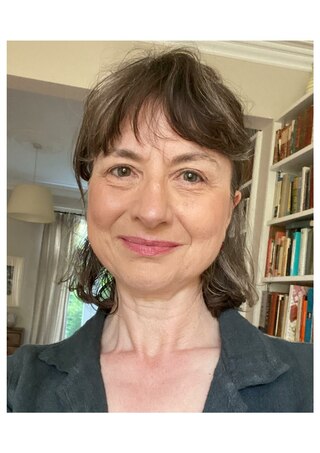Dame Linda Jane Colley, is an expert on British, imperial and global history from 1700. She is currently Shelby M. C. Davis 1958 Professor of History at Princeton University and a long-term fellow in history at the Swedish Collegium for Advanced Study in Uppsala. She previously held chairs at Yale University and at the London School of Economics. Her work frequently approaches the past from inter-disciplinary perspectives.

Anthony Thomas Grafton is an American historian of early modern Europe and the Henry Putnam University Professor of History at Princeton University, where he is also the Director the Program in European Cultural Studies. He is also a corresponding fellow of the British Academy and a recipient of the Balzan Prize. From January 2011 to January 2012, he served as the President of the American Historical Association. From 2006 to 2020, Grafton was co-executive editor of the Journal of the History of Ideas.
Teresa Morgan is an English academic and cleric, best known as the author of Literate Education in the Hellenistic and Roman Worlds and Roman Faith and Christian Faith.
Friedrich W. Solmsen was a German-American philologist and professor of classical studies. He published nearly 150 books, monographs, scholarly articles, and reviews from the 1930s through the 1980s. Solmsen's work is characterized by a prevailing interest in the history of ideas. He was an influential scholar in the areas of Greek tragedy, particularly for his work on Aeschylus, and the philosophy of the physical world and its relation to the soul, especially the systems of Plato and Aristotle.
Richard John Alexander Talbert is a British-American contemporary ancient historian and classicist on the faculty of the University of North Carolina at Chapel Hill, where he was William Rand Kenan, Jr., Professor of History (1988-2020) and then Research Professor in charge of the Ancient World Mapping Center until his retirement in 2024. Talbert is a leading scholar of ancient geography and ideas of space in the ancient Mediterranean world.

The Ptolemaic Kingdom or Ptolemaic Empire was an Ancient Greek polity based in Egypt during the Hellenistic period. It was founded in 305 BC by the Macedonian general Ptolemy I Soter, a companion of Alexander the Great, and ruled by the Ptolemaic dynasty until the death of Cleopatra VII in 30 BC. Reigning for nearly three centuries, the Ptolemies were the longest and final dynasty of ancient Egypt, heralding a distinctly new era for religious and cultural syncretism between Greek and Egyptian culture.

Joan Breton Connelly is an American classical archaeologist and Professor of Classics and Art History at New York University. She is Director of the Yeronisos Island Excavations and Field School in Cyprus. Connelly was awarded a MacArthur Fellowship in 1996. She received the Archaeological Institute of America Excellence in Undergraduate Teaching Award in 2007 and held the Lillian Vernon Chair for Teaching Excellence at New York University from 2002 to 2004. She is an Honorary Citizen of the Municipality of Peyia, Republic of Cyprus.
Svetlana Leontief Alpers is an American art historian, also a professor, writer and critic. Her specialty is Dutch Golden Age painting, a field she revolutionized with her 1984 book The Art of Describing. She has also written on Tiepolo, Rubens, Bruegel, and Velázquez, among others.

Ian Matthew Morris is a British historian, archaeologist, and Willard Professor of Classics at Stanford University.

Walter Scheidel is an Austrian historian who teaches ancient history at Stanford University, California. Scheidel's main research interests are ancient social and economic history, pre-modern historical demography, and comparative and transdisciplinary approaches to world history.
Apollonius was the dioiketes or chief finance minister of Egypt during the reign of Ptolemy II Philadelphus. Little is known about his personal life; in ancient documents, he is called simply "Apollonius the dioiketes" without recording his home city or his father's name. But a great amount of information has survived about his public role, in the archive of papyri kept by his assistant Zenon.
Esther Eidinow FBA is a British ancient historian and academic. She specialises in ancient Greece, particularly ancient Greek religion and magic. She has been Professor of Ancient History at the University of Bristol since 2017.
Dorothy Joan Thompson, is an ancient historian and classicist who specialises in the culture and society of Hellenistic Egypt, the early Hellenistic world, and documentary papyrology.

Emily Joanna Gowers, is a British classical scholar. She is Professor of Latin Literature at the University of Cambridge and a Fellow of St John's College, Cambridge. She is an expert on Horace, Augustan literature, and the history of food in the Roman world.
The Graduate School of Princeton University is the main graduate school of Princeton University. Founded in 1869, the school is responsible for all of Princeton's master's and doctoral degree programs in the humanities, social sciences, natural sciences, and engineering. The school offers Master of Arts (MA), Master of Science (MS), and Doctor of Philosophy (PhD) degrees in 42 disciplines. It also administers several pre-professional programs, including the Master in Finance (M.Fin.), Master of Science in engineering (M.S.E.), and Master of Engineering (M.Eng.), Master in Public Affairs (M.P.A.), Master in Public Policy (M.P.P.), and Master of Architecture (M.Arch.) degrees.
Lynn Meskell is an Australian archaeologist and anthropologist who currently works as a professor at the University of Pennsylvania.
Dee L. Clayman is an American classical scholar and a professor of Classics at the City University of New York. She is a pioneer in the effort to digitize the humanities and served as president of the Society for Classical Studies.
Deborah Kamen is Chair and Professor of Classics at the University of Washington. Her research is on Greek cultural and social history, with a particular focus on ancient slavery.

Jackie Murray is Associate Professor of Classics at the State University of New York at Buffalo. She is an expert on imperial Greek literature, Hellenistic poetry, and the reception of Classics in African American and Afro-Caribbean literature.







